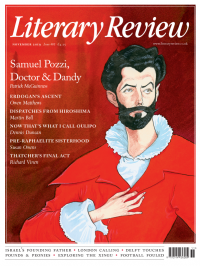Martha Sprackland
Out on a Limb
The Memory Police
By Yoko Ogawa (Translated from Japanese by Stephen Snyder)
Harvill Secker 274pp £12.99
By the time the islanders notice the ‘disappearance’ of their left legs, they have become accustomed to the process. Many things have been lost in the same manner on their island ‘full of holes’: hats, emeralds, birds, photographs, the ferry on which they had, in years past, travelled to and from the now-inaccessible mainland. What happens is less a disappearance than an estrangement: the townspeople wake to a feeling, a premonition of change, as the memory of something drains away, along with the word for it. The result is a compulsive discomfort that is alleviated only by purging the thing.
When the perfume was lost, the process had been simple: each vial of scent was opened and poured into the river, which reeked for days. Years later, when roses vanished, the inhabitants followed a similar path: anyone who grew them was to be found wrenching the petals from the blooms and scattering them into the water, to be washed out to sea and away from the reach of remembering. Anyone discovered hoarding perfume, birds, hats or roses – even the memories of these items – risks arrest by the Memory Police, indistinct figures who enforce this mass forgetting. It is unclear how and when this process began, though the living seem able, just, to recall its onset.
Things are more complicated, though, in the case of a leg. At first the people are alarmed, emerging unsteadily from their houses, their uncompliant legs throwing them off balance so that they have to hold on to walls or fences. In a functional sense the legs remain intact, joined

Sign Up to our newsletter
Receive free articles, highlights from the archive, news, details of prizes, and much more.@Lit_Review
Follow Literary Review on Twitter
Twitter Feed
It wasn’t until 1825 that Pepys’s diary became available for the first time. How it was eventually decrypted and published is a story of subterfuge and duplicity.
Kate Loveman tells the tale.
Kate Loveman - Publishing Pepys
Kate Loveman: Publishing Pepys
literaryreview.co.uk
Arthur Christopher Benson was a pillar of the Edwardian establishment. He was supremely well connected. As his newly published diaries reveal, he was also riotously indiscreet.
Piers Brendon compares Benson’s journals to others from the 20th century.
Piers Brendon - Land of Dopes & Tories
Piers Brendon: Land of Dopes & Tories - The Benson Diaries: Selections from the Diary of Arthur Christopher Benson by Eamon Duffy & Ronald Hyam (edd)
literaryreview.co.uk
Of the siblings Gwen and Augustus John, it is Augustus who has commanded most attention from collectors and connoisseurs.
Was he really the finer artist, asks Tanya Harrod, or is it time Gwen emerged from her brother’s shadow?
Tanya Harrod - Cut from the Same Canvas
Tanya Harrod: Cut from the Same Canvas - Artists, Siblings, Visionaries: The Lives and Loves of Gwen and Augustus John by Judith Mackrell
literaryreview.co.uk